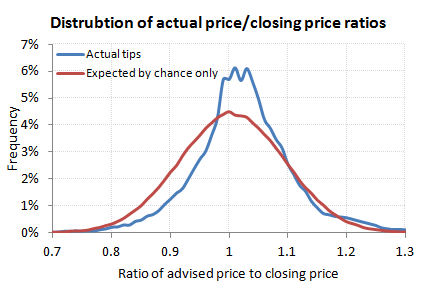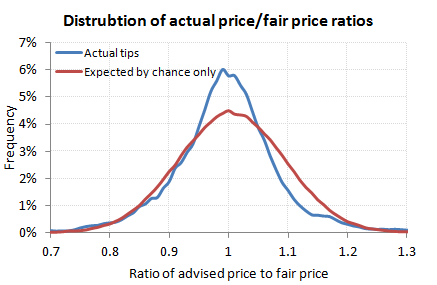Do Tipsters Beat the Odds in a Betting Market?
Posted 26th January 2016
For 14 years between 2001 and 2015 I verified sports betting advisory services motivated to show an honest record of their activity. Towards the end of this period I told the story in my book How to Find a Black Cat in a Coal Cellar: The Truth about Sports Tipsters. My conclusions were stark: few tipsters are capable of making a profit beyond that which could be expected to happen by chance alone. We can equally well apply this conclusion to sports bettors as a whole.
A few people have argued, however, that I have done tipsters a disservice by setting the burden of proof (in establishing skill above luck) far too highly. Furthermore, in using a frequentist approach to statistical significance testing of a betting record, I have not actually been evaluating the presence of skill at all, merely the probability that betting performances arise by chance assuming no skill to be present. Following this methodology, it can take bettors (and tipsters) many hundreds, even thousands of tips, before one might reasonably rule out chance as sole explanation for a set of profits. Arguably, there is another way we can seek to determine whether a tipster or bettor possesses any skill: see whether he is beating the market.
Those who work or invest in the financial sector are more familiar with the term "beating the market." Typically, it is taken to mean that the investor produces a better return than the market average. But this doesn't really get to the heart of it. Investors can and do beat the market all the time. The more important question is whether they are doing that because they have been lucky or because they are skilled. One way to set about analysing the distinction would be to see how often the investor can anticipate the future movement of the market. A similar approach can be used for a sports betting market. If bettors are backing prices which more readily fall than rise after they have backed them, this would imply that, on average, they possess information about the events that had yet to be taken into account by the market as a whole at the time they make their bets. As such, a punter who causes a betting price to fall can be treated as someone smarter than the market. His action of betting is equivalent to bringing his superior information to the market, which subsequently adjusts to reflect that information until, assuming the efficient market hypothesis to be true, it is no longer exploitable for a profit.
The more information, through the opinions of bettors expressed via their wagers, that is brought to a market, arguably the more accurate (or efficient) it becomes at correctly estimating the true probabilities of sporting outcomes. Evidently, the point in a betting market at which the most number of opinions has been expressed occurs at its closing, i.e. at the start of the event. Thus we can begin to form a hypothesis: if the bettor or tipster more often than not manages to beat the closing price with the odds that he backs, this would be indicative of possessing smarter information than the market, and hence of possessing predictive skill. Indeed, this is precisely how sharp bookmakers mark their customers, using sharps to help them adjust their lines to become more efficienct. Presumably, it is also how other betting brands seek out and limit/ban those sharps.
Taking a sample of 48 tennis tipsters for which I had collected closing prices for their match bets, I set out to test whether any of them had been capable of beating the closing market. Together they advised a total of 7,170 bets (excluding voids due to retirements as well as erroneous data). Backing these tips to level stakes at the advised prices returned a profit over turnover (yield) of -0.94% at average odds of 2.466. This compares to a yield of -2.66% had those tips been backed at closing market prices with an average of 2.436. 59.1% of advised prices beat the closing market. 38 out of 48 (or 79%) of the tipsters managed to beat the closing market on more than 50% of occasions (50% being that predictable by chance alone). These results are indicative of a set of tipsters who, collectively at least, were bringing information to the market. Their distribution of actual price / closing price ratios is shown in the chart below, compared to what we might expect to see if players were only guessing. Their distribution shows greater kurtosis (values bunched more tightly around the mean) as well as a greater proportion of ratios above 1.00 (where advised prices were greater than closing ones). The difference between the two distributions is hugely statisically significant.

Nevertheless, despite bringing this information with them to the market, it was not enough to secure an overall aggregate profit. That much is probably obvious from the small difference between average tipped betting price and average closing price (just 0.03). We might wonder whether that was because the tipsters hadn't secured the best possible prices. Instead, let's analyse whether these tipsters managed to beat fair prices. We can estimate what these should be by removing the bookmaker's margin from the closing prices. I've previously described a betting odds pricing model which looked at how this might be achieved. Doing so reveals an average fair price of 2.548. In other words, despite beating the closing prices, the information these tipsters brought to the market was not of sufficient quality to beat the fair prices (based on the closing market). Indeed, using the difference between every tipped price and its fair price equivalent, the expected yield from these 7,170 tips was -0.90%, almost the same as the actual yield. Only 44.7% of tips advised beat the fair price, with only 14 of the 48 tipsters (29%) achieving better than 50% success on that score. Not one of them managed a positive profit expectation (based on this analysis) that was even remotely statistically significant. Indeed, only 2 tipsters with greater than 100 advised tips managed to achieve better than a +1% yield expectation, the highest being 2.99%. The distribution of advised price / fair price ratios is similarly shown below, again compared to chance.

This analysis has revealed that sports betting tipsters might very well be capable of outperforming the market, through possession of superior information which they then seek to exploit. Unfortunately, for this collection of tipsters at least, that information is not sufficient in aggregate to overcome the costs of playing in the market as imposed by the bookmakers via means of their overround. Collectively, they have been unable to secure betting prices that would be superior to those implied by fair probabilities of outcomes. Whilst a number of tipsters individually beat the fair market, it was impossible to argue that any did so on the basis of anything other than luck. Of course, this is not to argue that no tipster or bettor can do better than luck, merely to offer further evidence that not very many of them do. Remember, also, that these tipsters claim to be experienced bettors who know how to analyse games and read player form. What would we find if we analysed a collection of regular punters?
Readers should consider evaluating their own performances against closing markets and their implied fair market equivalents, since arguably this provides another useful method to see whether you are smart enough to secure a profit from sports betting in the long run. If nothing else, it might offer you confidence during losing periods that the reason you had been losing was due to bad luck. Of course, by the same token, it may also indicate whether winning runs have been due to nothing more than good fortune.
|






